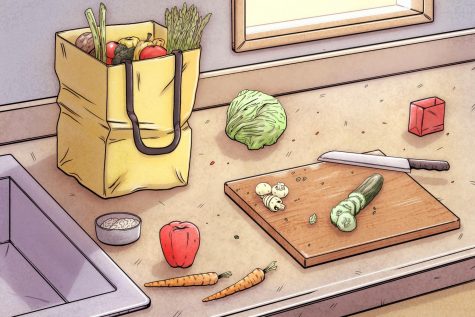From apps to home deliveries, farmers markets are adjusting to the coronavirus
April 26, 2020

Shortened work hours and canceled events are causing trouble for farmers markets across Chicago and pushing them to find alternative ways to get fresh produce to customers while keeping farmers’ businesses running.
Plazas once packed full of people buying fresh produce, sampling coffee and enjoying free musical entertainment now go empty as former visitors are now working at home.
The 61st Street Farmers Market, 6100 S. Blackstone Ave., is just one of the markets within the Chicago area affected by the coronavirus, or COVID-19, pandemic. Under Illinois’ stay-at-home order, farmers markets can remain open as essential businesses.
Connie Spreen, the market’s director, said the South Side market usually brings healthy, locally-grown foods to the area from January to April. Now, with the shelter-in-place order, its vendors have assigned one staff member to bag and select food, and another to handle money in line with social distancing recommendations.
Even with these procedures in place, Spreen said at least 270 customers stopped by the market, but it’s about half the number of people they typically see in the winter.
Still, Spreen said customers told her it was a “breath of fresh air” that the market stayed open in March during a time when many markets have closed. Spreen added that customers said they really felt like the market cared about the community.
However, some consumers remain concerned about contracting the coronavirus by touching produce at farmers markets and grocery stores.
Ally Manzella, a senior photography major, moved back home to Plainfield, Illinois, for a few weeks because of the coronavirus crisis and began cooking more meals with her mother.
“My mom [and I] pretty much plan our day around what we are cooking for dinner,” Manzella said. “We have tried a new recipe every day.”
She said she is staying away from fresh produce because grocery stores are “crazy right now.” On top of that, Manzella wants to stay away from produce at the moment in order to limit the chance of infecting someone if she is a carrier.
“You can go buy a box of cereal and wipe down the box but you cannot wipe down an apple fully,” Manzella said.
Although Manzella said she is more likely to purchase produce from a grocery store, she said she would support farmers markets through online purchases as it becomes available.
According to the Brookings Institute, a nonprofit public policy organization, farmers markets may actually be a safer alternative to grocery stores.
“The physical aspects of farmers markets may actually make them safer than grocery stores, given their adaptability to shifting public health contexts,” according to an April 8 Brookings Institute report. “Despite serving as gathering places in ordinary times, open-air markets allow for greater social distancing, and temporary booths grant flexibility and enhanced cleaning capabilities.”
Streeterville Organization of Active Residents, 244 E. Pearson St., plans to open June 2 as usual, but is concerned about the health of their farmers and customers across the Midwest.
Deborah Gershvein, SOAR’s president, said one idea they are considering is to have an order and delivery system put in place where customers pre-order their produce then pick it up at the farmers’ trucks already packaged and ready to go.
Some farmers market vendors have already begun home deliveries of their own.
The Green City Market, a year-round market with three locations, created an app in a week that allows customers to order their food online and have it delivered.
Green City Market’s Executive Director Melissa Flynn said the market can handle approximately 100 delivery slots. She said the market is also looking into creating pick-up locations for its customers.
The market created a “tiered response,” Flynn said, as customers can order from multiple farmers at once.
However, the market is tentative in its plans because of future uncertainties due to the pandemic, Flynn said.
“This is such a critical time for vendors,” Flynn said. “The farmers are very nervous and very anxious with the uncertainty of when we will be able to open the market back [up].”







